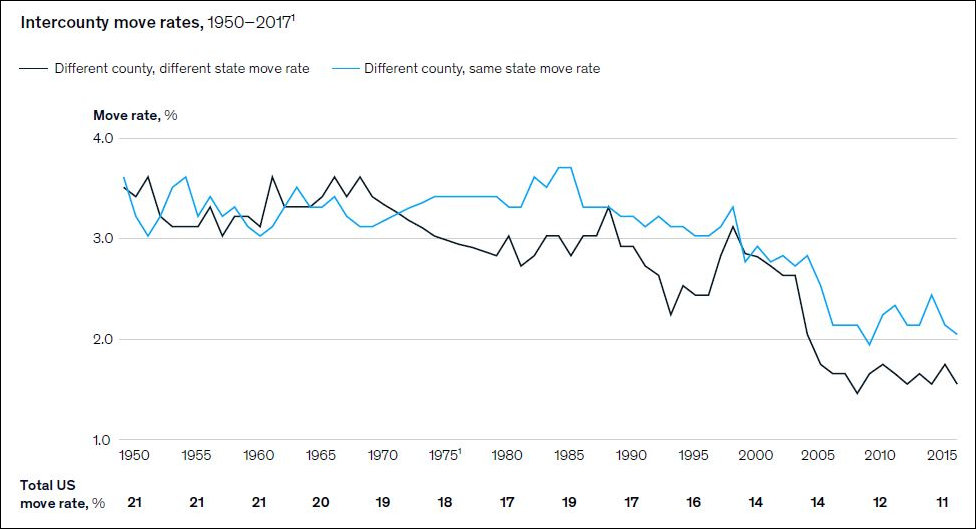by James A. Bacon
A recurring question on this blog and elsewhere is why don’t more Americans (and rural Virginians) move to areas of greater economic opportunity? Why do they remain stuck in communities with high unemployment and low wages? Americans have always moved to economic opportunity in the past. What’s different now?
Those questions give rise to another set of questions. If people refuse to budge, should the rest of society take pity on them and subsidize their choice to stay put? As Don Rippert commented in a previous post, “The best thing the state can do is issue relocation vouchers to rural residents.”
The authors of a McKinsey Global Institute report, “The Future of Work in America,” tackles the geographic-mobility question. The biggest factor, they suggest, is the vast and growing gap in the cost of living between prospering cities and lagging communities. “Variations in the cost of living — and particularly in housing costs — are a clear contributing factor holding back geographic mobility in the United States. The cities offering the greatest job opportunity also happen to be expensive places to live.”
An example:
Imagine a stock clerk in Ohama who loses her job. She could look for a similar position locally, hoping to match her former salary of just under $28,000. Another option would be moving to San Francisco, where the economy is booming and the median salary for the same position is $35,240 — well above what she could make it she stays put. But the latter option may leave her in worse economic shape despite the higher salary. The average rent on a two-bedroom apartment is $1,025 in Omaha but $4,520 in San Francisco. In April 2019, a gallon of gas cost $2.55 in Omaha and $3.83 in San Francisco. Furthermore, her partner has a steady job in Omaha that would be lost in any move, and her mother is nearby to help with children.
That’s an extreme case, but it makes the point that the Cost of Living matters.
Another factor restricting state-to-state mobility is the growing web of occupational licensing requirements. (The Bureau of Labor Statistics estimates that 23% of full-time workers have a license.)
Finally, McKinsey suggests, “Many people have deep ties to where they live.” They value their connections with family and friends. When they do move to another community, people tend to move to similar locations — city dwellers to other cities, suburbanites to other suburbs, and rural dwellers to small towns.
Bacon’s bottom line: I’m of two minds. On the one hand, if people want to “live their values” and stay put to be close to family and friends, that’s their choice. They shouldn’t expect society to subsidize their choices through endless government programs designed to shore up rural economies and incomes. They enjoy a benefit that others who do decide to move: proximity to family and friends. You can’t put a price tag on that but it’s worth a lot.
On the other hand, the high cost of housing is a real barrier here in Virginia, especially if people want to move to the state’s most dynamic regional economy in Northern Virginia. Rural and small-town residents who manage to earn a college degree — those who have earning potential in the big metros — frequently do move. They can earn enough money to cover the higher cost of living. But low-income, low-skill residents of say, Grundy or South Boston face the prospect of a lower standard of living if they move to Manassas or Arlington.
One way to address the problem of inter-regional mobility in Virginia is to increase the supply of affordable housing in Northern Virginia and, increasingly, in Richmond, Hampton Roads, and Charlottesville. As a bonus, that would address the plight of poor people already living in those regions.
Which problem is more intractable and expensive to solve: increasing the supply of affordable housing (and attendant transportation capacity) in our major metro areas or funding broadband and other economic palliatives for rural Virginia? It may be cheaper for taxpayers to keep rural Virginia’s lower-income in rural Virginia… although I am open to hearing other arguments.



